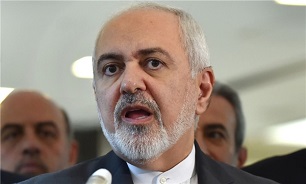Zarif Blasts FATF for Politically-Driven Decisions
 Referring to FATF’s recent warning to Iran, Zarif told reporters today that the decision declared by FATF is totally political and Iran vehemently disagrees with it.
Referring to FATF’s recent warning to Iran, Zarif told reporters today that the decision declared by FATF is totally political and Iran vehemently disagrees with it.
"The Islamic Republic considers anti-money-laundering policies as a necessity and a target in its domestic regulations,” he noted.
He hoped that after having anti-money-laundering rules ratified by the Iranian administration and jurisdiction, the country will be able to take further measures in this regard through convergence of Iranian bodies.
In a statement on Friday, FATF said, “If before February 2020, Iran does not enact the Palermo and Terrorist Financing Conventions in line with the FATF Standards, then the FATF will fully lift the suspension of counter-measures and call on its members and urge all jurisdictions to apply effective counter-measures, in line with recommendation 19.”
Iran has has been required to fulfill dozens of FATF recommendations to enhance its status from a blacklist of non-cooperative countries, while the country is under US sanctions. The country's status in FATF has no impact on toughening or easing the US sanctions.
FATF has required Iran to implement a number of moves that include endorsement of several conventions.
Palermo bill is one of the four government bills seeking to bring Iran's anti-money laundering and countering terrorism financing standards into line with those defined by the FATF.
The parliament has approved all the measures but except for the bill that updates Iran's domestic law on countering financing of terrorism. All the rest have been rejected by the Guardian Council – a watchdog that ensures laws are in line with the Constitution and Sharia.
The bills on Iran’s accession to the Palermo Convention and the convention against the funding of terrorism (CFT) were rejected by the Guardian Council in early November due to some flaws that violated the country’s Constitution. The bills were then amended by the Iranian Parliament, waiting for the next steps in the Guardian Council.
To fulfill FATF requirements, President Hassan Rouhani’s administration has proposed four bills to the parliament for approval, two of which are still undecided, including the Palermo Convention. They have been referred to the Expediency Council for final approval.
Yet, Iran has recently approved a national anti-money laundering (AML), which was a domestically-developed bill.
In its October meeting, the FATF decided to extend the deadline for Iran until February to complete reforms under the specified action plan that includes a list of 9 major moves, including the opening of its financial transactions data bank to the FATF that is headed by the US Department of the Treasury’s Assistant Secretary heading the Office of Terrorist Financing and Financial Crimes Marshall Billingslea.
The Political-Defense-Security and Legal-Judicial Commissions of the EC declared in January that endorsement of the Palermo bill would run against the country's interests.
In relevant remarks on January 26, Secretary of Iran's Expediency Council Mohsen Rezayee announced that the EC's specialized commissions have rejected the country's endorsement of the Palermo bill, adding that the final decision will be made in the Council's next meeting.
Speaking to reporters after an Expediency Council meeting on Palermo convention here in Tehran, Rezayee said that the EC's specialized commissions have concluded that harms and losses of Iran's endorsement of the convention would overpass its merits.
"It is a reality but the EC will have the final decision in this regard," he added.
Asked if Iran is entitled to set preconditions to join Palermo and the blur conditions surrounding this issue, Rezayee said, "Of course, there are much more ambiguities too and it was decided that the pros and cons study them in the next meeting."
It was the second week in a row that the EC deferred the decision on the bill for further studies.
Message end/
